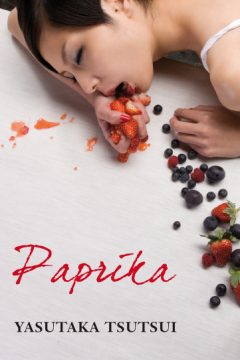Paprika

Paprika – exotic, piquant, to be used sparingly. The eponymous heroine of Tsutsui’s 1993 novel is the alter ego of brilliant and beautiful psychotherapist Atsuko Chiba, one of the leading brains in the Institute for Psychiatric Research. An expert in the use of ‘psychotherapy devices’ that trap a patient’s dreams and display them on a monitor, Atsuko is able to manipulate those dreams, even enter them, as an aid to psychoanalysis. When treating private patients, Atsuko transforms herself into the guise of Paprika – a captivating girl of unknown age – to mask her true identity.
As Paprika delves ever deeper into her realm of fantasy, the borderline between dream and reality becomes increasingly blurred. All the more so when a colleague at the Institute develops a new device that allows the dreams of several individuals to be combined simultaneously. With this, they enter dangerous territory – far from curing their patients, they could drive them insane. They face opposition from a faction of ‘traditionalists’ within the Institute, who attempt to thwart them at every turn. This battle between the two factions provides the novel with the thread of a plotline.
Paprika, Tsutsui’s last work before his self-imposed three year hiatus in the mid-1990’s, could be described as the very pinnacle of his art. Rich in humorous dialogue and ridiculous situations, replete with the folly of human desires, yet with an underlying sense of menace that ‘all is not what it seems’. Of course, by exploring the world of dreams and their relevance to psychoanalysis, Tsutsui returns to a subject that has engaged him since his student days. But it is in his juxtaposition of opposites, his multi-level approach that his forte as a writer lies.
In Paprika, the principal duality is, of course, between dreams and reality, the central theme of the work. But there is also the duality inherent in the heroine – Atsuko, a mature, successful scientist, against Paprika, a whimsical adolescent who has assignations with older men in bars. Age and youth. Madness and sanity. Traditionalism against experimentalism. The battle between Atsuko and her enemies at the Institute could, indeed, be seen as an underlying statement by the author. The reality-deconstructing potential of the experimentalist Paprika is threatened by the traditionalists’ rigorous adherence to dogma – just as Tsutsui’s own experimentation with literary forms has met with heavy criticism from Japan’s intellectual elite.
But in the end, the boundary-transgressor is the survivor, and Atsuko is awarded the Nobel Prize in Physiology or Medicine. Or is she? In a mystifying epilogue, we are left with two waiters in a bar where Paprika has plied her trade. One turns to the other and asks, “So – it was all a dream, was it?”

